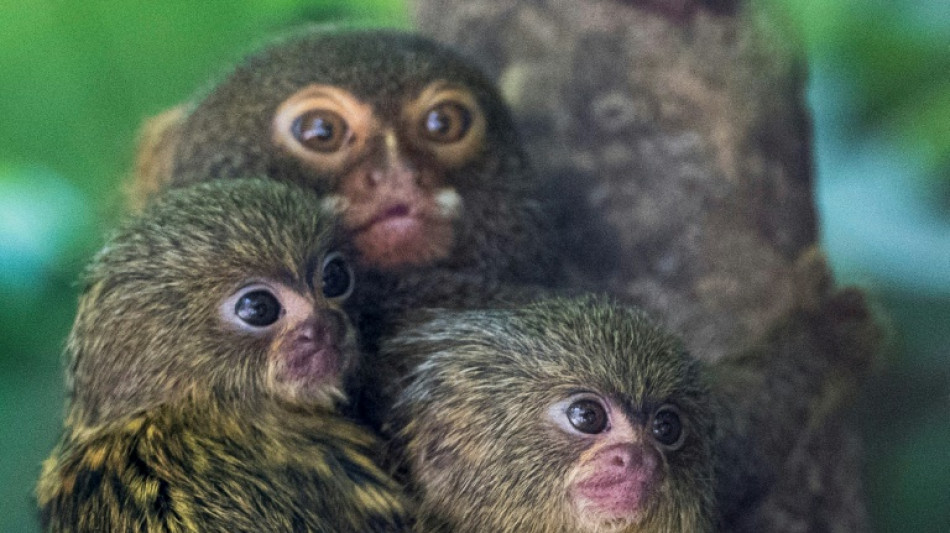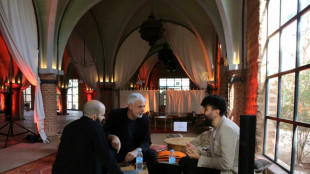
-
 Iran Nobel winner released for three weeks, 'unconditional' freedom urged
Iran Nobel winner released for three weeks, 'unconditional' freedom urged
-
Red Cross marks record numbers of humanitarians killed in 2024

-
 Johnson's Grand Slam 'no threat', says World Athletics boss Coe
Johnson's Grand Slam 'no threat', says World Athletics boss Coe
-
Qatar's emir and UK's Starmer talk trade as state visit ends

-
 Cuba suffers third nationwide blackout in two months
Cuba suffers third nationwide blackout in two months
-
Russia, Ukraine to send top diplomats to OSCE summit in Malta

-
 Spanish royals to attend memorial service for flood victims
Spanish royals to attend memorial service for flood victims
-
LPGA, USGA new policy requires female at birth or pre-puberty change

-
 Stick to current climate change laws, US tells top UN court
Stick to current climate change laws, US tells top UN court
-
British Museum chief says Marbles deal with Greece 'some distance' away

-
 Pope Francis receives electric popemobile from Mercedes
Pope Francis receives electric popemobile from Mercedes
-
Gaza civil defence: thousands flee Israeli strikes, evacuation calls

-
 Trump names billionaire private astronaut as next NASA chief
Trump names billionaire private astronaut as next NASA chief
-
Pidcock to leave INEOS Grenadiers at end of season

-
 Seoul stocks weaken, Paris advances despite political turmoil
Seoul stocks weaken, Paris advances despite political turmoil
-
South America summit hopes to seal 'historic' trade deal with EU

-
 DAZN awarded global TV rights for Club World Cup
DAZN awarded global TV rights for Club World Cup
-
Top executive shot dead outside New York hotel

-
 Vaping while still smoking unlikely to help quitters: study
Vaping while still smoking unlikely to help quitters: study
-
British Museum chief says Parthenon Marbles deal with Greece 'some distance' away

-
 'Creating connections': Arab, African filmmakers gather at Morocco workshops
'Creating connections': Arab, African filmmakers gather at Morocco workshops
-
Iran frees Nobel winner for three weeks, sparking calls for 'permanent' release

-
 Brazil's Minas cheese gets added to UNESCO list
Brazil's Minas cheese gets added to UNESCO list
-
Top US executive shot dead in New York City: media

-
 Trump's nominee to run Pentagon hangs by a thread
Trump's nominee to run Pentagon hangs by a thread
-
GM announces more than $5 bn hit to earnings in China venture

-
 World chess champ Ding, teen challenger tied past halfway mark
World chess champ Ding, teen challenger tied past halfway mark
-
Georgia police raid opposition offices as PM vows to curb protests

-
 S. Korea opposition begins push to impeach president
S. Korea opposition begins push to impeach president
-
Syrian army fights rebel offensive with counterattack

-
 France court upholds Polanski acquittal in defamation case
France court upholds Polanski acquittal in defamation case
-
UK bans daytime TV ads for cereals, muffins and burgers

-
 Palace's Guehi to face no formal action over 'Jesus' message on rainbow armband
Palace's Guehi to face no formal action over 'Jesus' message on rainbow armband
-
UK faces trade balancing act with Trump, EU

-
 Iran releases Nobel Peace laureate Mohammadi on medical leave: lawyer
Iran releases Nobel Peace laureate Mohammadi on medical leave: lawyer
-
UNESCO grants heritage status to Aleppo soap as Syria war flares

-
 Ghana's illegal mining boom seeps into presidential election
Ghana's illegal mining boom seeps into presidential election
-
Inconsistent Spurs 'progressing in all aspects': Postecoglou

-
 France's Orano says Niger junta controls uranium firm
France's Orano says Niger junta controls uranium firm
-
Seoul stocks weaken, Paris edges up tracking political turmoil

-
 China reports warmest autumn since records began
China reports warmest autumn since records began
-
French marine park to close over law banning killer whale shows

-
 Thousands march demanding S. Korea president resign over martial law debacle
Thousands march demanding S. Korea president resign over martial law debacle
-
Taiwan romance novelist Chiung Yao dies at 86

-
 In Angola, Biden promises to invest differently to China
In Angola, Biden promises to invest differently to China
-
Syrian army launches counteroffensive against rebels

-
 Evenepoel says 'long journey' ahead after postal van collision
Evenepoel says 'long journey' ahead after postal van collision
-
South Korea's day of rage as Yoon's martial law founders

-
 UK police question killer nurse Letby over further baby deaths
UK police question killer nurse Letby over further baby deaths
-
Cameroon curator Kouoh is first African woman to lead Venice Biennale


Monkey monikers: Like humans, marmosets give each other names
Naming others is considered a marker of highly advanced cognition in social animals, previously observed only in humans, bottlenose dolphins and African elephants.
Marmoset monkeys have now joined this exclusive club, according to a new study published in Science on Thursday.
The diminutive primates use loud, high-pitched calls to assign each other "vocal labels," as shown in research conducted by a team at the Hebrew University of Jerusalem.
"We are very interested in social behavior because we think that social behavior is essentially what drove us humans to be so special compared to other animals," senior author David Omer told AFP.
"We don't run fast, we don't fly, we don't excel in anything else besides being social and all our achievements as a society are our societal achievements."
Marmosets are ideal subjects to study the evolution of social behavior and language in humans, he explained, because they exhibit similar traits, living in small monogamous family groups of six to eight individuals that cooperatively rear their young.
Led by graduate student Guy Oren, the researchers recorded natural conversations between pairs of marmosets separated by a visual barrier, as well as interactions between the monkeys and a computer system that played back pre-recorded calls.
They discovered that marmosets use "phee calls" -- very high-pitched vocalizations, as loud as power tools -- to address one another. Notably, the monkeys could recognize when such calls were directed at them and were more likely to respond when addressed by their name.
- Machine learning advances -
The ten marmosets they tested came from three separate families, and the research also revealed that members within a family group used similar sound features to code different names, akin to dialects or accents in humans. This held true even for adult marmosets that weren't related by blood, suggesting they learned from others within the family group.
Marmosets are relatively distant relatives of humans. We last shared a common ancestor around 35 million years ago, while the split between ourselves and chimpanzees could have happened 5-7 million years ago.
Rather than genetic proximity, Omer attributes the acquisition of vocal labels by marmosets to "convergent evolution," or the idea that they evolved similar traits in response to comparable environmental challenges.
For marmosets, vocal labeling may have been crucial for maintaining social bonds and group cohesion in the dense rainforests of South America, where visibility is often limited.
How and when humans first began talking is a matter of debate, but until recently many scientists had dismissed the idea we could look to other primates for clues. Omer stressed the latest research was yet another blow to that long-standing opinion.
"We can still learn a lot from non-human primates about the evolution of language in humans," he said.
The team's statistical analysis of the marmosets' calls was made possible by recent advancements in computational power and machine learning, he added. Looking ahead, one exciting avenue for future research could be leveraging AI to further decipher the content of marmoset conversations.
N.Fournier--BTB


